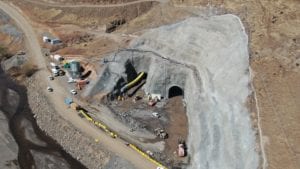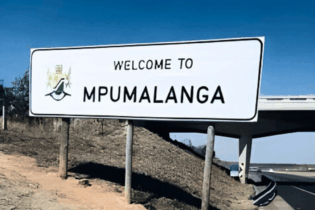Despite a slow start in May due to extended Covid-19 restrictions, underground tunneling works inside the two Polihali Diversion Tunnels, which form part of Phase II of the Lesotho Highlands Water Project, is progressing well.
Continued border restrictions between Lesotho and South Africa continues to pose travel challenges for South African-based technicians and the movement of equipment and supplies, however the Lesotho Highlands Development Authority (LHDA) reports that tunnel excavations are advancing from the outlets at about six meters a day per tunnel. The tunnels, which both run almost 1 km in length and are 7 m and 9 m in diameter respectively, run parallel to each other from the intake point to the outlet downstream of the dam. The tunnels are being excavated by drill and blast method and are supported by rockbolts and shotcrete as required.They are being excavated in advance of the construction of the Polihali Dam to reduce the dam construction period. Impoundment of Polihali Reservoir is expected to commence in 2024 with water delivery planned to start in 2027.
Excavation of the intake and outlet portals has been completed and work on the tunnels’ concrete lining is underway with concrete casting and reinforcement started on tunnel one. Both tunnels intake and outlet portals drives have been supported with sprayed concrete and rockbolts and preparatory works for the concrete inlet structure are ongoing. “As construction picks up on the diversion tunnels, the teams continue to observe LHDA’s strict health and safety protocols to ensure that the work environment is safe for crews. These protocols include airborne contaminant monitoring, monitoring of the excavation works, rock support and work area temperature and monitoring air flow among other measures. The project invests heavily in safety measures hence the installation of ventilation fans inside the tunnels, in August,” says Tente Tente, LHDA’s Chief Executive.






